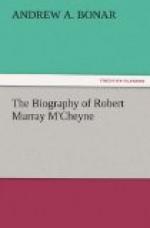It was a singular event,—often still it looks like a dream,—that four ministers should be so suddenly called away from their quiet labors in the towns and villages of Scotland, and be found in a few weeks traversing the land of Israel, with their Bibles in their hand, eye-witnesses of prophecy fulfilled, and spies of the nakedness of Israel’s worship and leanness of soul. The details of that journey need not be given here. They have been already recorded in the Narrative of a Mission of Inquiry to the Jews from the Church of Scotland in 1839. But there are some incidents worthy to be preserved which could find a place only in such a record of private life and feelings as we are now engaged in.
When Mr. M’Cheyne was on board the vessel that carried him to London, he at once discovered an interesting young Jew, who seemed, however, unwilling to be recognized as belonging to the seed of Abraham. He made several attempts to draw this young Israelite into close conversation; and before parting, read with him the 1st Psalm in Hebrew, and pressed home the duty of meditating on the word of the Lord. In visiting Bethnal Green, he has noted down that it was very sweet to hear Jewish children sing a hymn to Jesus, the burden of which was [Hebrew: tavuach aleinu], “Slain for us!”
The awful profanation of the holy Sabbath which we witnessed on the streets of Paris, called forth the following appeal, in a letter to Mr. Macdonald of Blairgowrie. His spirit had been stirred in him when he saw the city wholly given to idolatry. “Stand in the breach, dear friend, and lift up your voice like a trumpet, lest Scotland become another France. You know how many in our own parishes trample on the holy day. They do not know how sweet it is to walk with God all that holy day. Isaiah 58:11-14 is a sweet text to preach from. Exodus 31:13 is also very precious, showing that the real sanctifying of the Sabbath is one of God’s signs or marks which He puts upon his people. It is one of the letters of the new name, which no one knoweth but they who receive it.”
In his brief notes during the first part of the journey, he has seldom failed to mark our seasons of united prayer, such as those in the cabin of the vessel on the passage to Genoa; for these were times of refreshing to his spirit. And his feelings, as he stood in that city and surveyed its palaces, are expressed in a few lines, which he sent homeward from the spot. “A foreign land draws us nearer God. He is the only one whom we know here. We go to Him as to one we know; all else is strange. Every step I take, and every new country I see, makes me feel more that there is nothing real, nothing true, but what is everlasting. The whole world lieth in wickedness! its judgments are fast hastening. The marble palaces, among which I have been wandering to-night, shall soon sink like a millstone in the waters of God’s righteous anger; but he that doeth the will of God abideth forever.”




